OAT workshop 2022, New Zeeland
Virtual reality researchers and developers need tools to develop state of the art technologies that will help advance knowledge. Promoting open-Source tools which can be modified or redistributed will be of great help for doing this. Open-Source tools are one means to propagate best practice as they lower the barrier to entry for researchers from an engineering point of view, while also embodying the prior work on which the tools were built. Open access tools are also critical to eliminate redundancies and increase world research collaboration in VR. At a time that academic research is growing it also needs to move as fast as industry, collaboration and shared tools are the best way to do it. In this scenario, it is more important than ever that academic research builds upon best practices and results to amplify impact in the broader field.
Driven by uptake in consumer and professional markets, virtual reality technologies are now being developed at a significant pace. Open access tools are also critical to eliminate redundancies and increase world research collaboration in VR. At a time that academic research needs to move as fast as the industry, collaboration and shared tools are the best way to do it. We will gather creators and users of open-access libraries ranging from avatars (like the Microsoft Rocketbox avatar library) to animation to networking (Ubiq toolkit) to explore how open access tools are helping advance the VR community. We invite all researchers to join the second edition of this workshop and learn from existing libraries. We also invite submissions on technical and systems papers that describe new libraries and or new features of existing libraries. In this workshop, we will explore these open-access tools, their accessibility, and what type of applications they enable.
We invite all researchers to join the third edition of this workshop and learn from existing libraries. We also invite submissions on technical and systems papers that describe new libraries and or new features on existing libraries. In this workshop, we will explore these open-access tools, their accessibility, and what type of applications they enable. Finally, we invite users of current libraries to submit their papers and share their learnings while using these tools. All papers and repos will be collected and curated in the workshop website https://openaccess.github.io/
- Open source libraries and tools (from avatars to AI to tracking to networking)
- Research libraries and tools
- New tools, new features, new repos
- Usage of libraries/tools
- Open datasets
Submissions should include a title, a list of authors, and be 2-4 pages. All paper submissions must be in English. All IEEE VR Conference Paper submissions must be prepared in IEEE Computer Society VGTC format ( https://tc.computer.org/vgtc/publications/conference/) and submitted in PDF format. Accepting work of Research papers, Technical notes, Position papers, Work-in-progress papers.
The accepted papers will be featured in the IEEE Xplore library. Additional pages can be considered on a case by case basis, but you should check with the workshop organizers before the submission deadline. Acceptable paper types are work-in-progress, research papers, position papers, or commentaries. Submissions will be reviewed by the organisers and accepted submissions will give a 10-minute talk with a panel discussion at the end of the session. At least one author must register for the workshop. Selected submissions will get the opportunity to be extended to articles to be considered for a special issue.
To submit your work, visit https://new.precisionconference.com/vr
The organizers will review all the submissions.- Submission deadline: January 12th, 2024
- Notification of acceptance: January 18th, 2024
- Camera-ready deadline: January 24th, 2024
- The workshop will be in person.
1:30 - 1:55 PM
Keynote speaker Dr. Ryan McMahan
Break
Workshop presentations
-
2:00PM - 2:15 PM
Do, Tiffany
The Influence of Mixed-Gender Avatar Facial Features on Racial Perception: Insights from the VALID Avatar Library -
2:15 PM - 2:30 PM
Mitchell, Kenny
DanceMark: An open telemetry framework for latency-sensitive real-time networked immersive experiences -
2:30 PM - 2:45 PM
Sterna, Radoslaw
The Free Viewing VR presentation tool -
2:45 - 3:00 PM
Marfia, Gustavo
Flying in XR: Bridging Desktop applications in eXtended Reality through Deep Learning -
3:00 PM - 3:15 PM
Murray, John
Discovering the Metaverses: Towards Open Federated Immersive Authoring Platforms -
3:15 PM - 3:25 PM
Wang, Cheng Yao
CollabXR: Bridging Realities in Collaborative Workspaces with Dynamic Plugin and Collaborative Tools Integration -
3:25 PM - 3:30 PM
Gonzalez, J Eric
XDTK: A Cross-Device Toolkit for Input & Interaction in XR -
Food break
3:30 - 4:00 PM -
4:00 PM - 4:15 PM
Ehret, Jonathan
StudyFramework: Comfortably Setting up and Conducting Factorial-Design Studies Using the Unreal Engine -
4:15 PM - 4:30 PM
Andrist, Sean
SIGMA: An Open Source Interactive System for Mixed-Reality Task Assistance Research -
4:30 PM - 4:45
Bovo, Riccardo
WindowMirror: an opensource toolkit to bring interactive multi-windowviews into XR -
4:45 PM - 5:00 PM
Workshop end by organizers
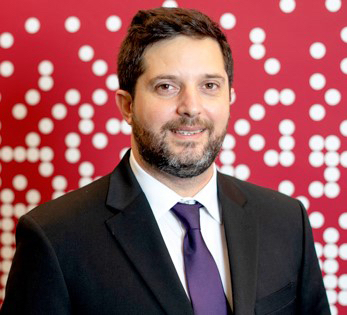
Matias Volonte, Clemson University
mvolont@clemson.edu
Matias Volonte is an Assistant Professor at Clemson University. Currently, Matias is investigating the use of virtual agents in which human-agent relationships improve task outcomes in the healthcare domain. Matias is interested in researching simulated face-to-face conversations with an emphasis on the relational and conversational aspects of these interactions. In his Ph.D. at Clemson University,

Anthony Steed, University College London
a.steed@ucl.ac.uk @anthony_steed
Prof. Anthony Steed is Head of the Virtual Environments and Computer Graphics (VECG) group at University College London. Prof. Steed’s research interests extend from virtual reality systems, through to mobile mixed-reality systems, and from system development through to measures of user response to virtual content. He has worked extensively on systems for collaborative mixed reality. He is lead author of a review “Networked Graphics: Building Networked Graphics and Networked Games”. He was the recipient of the IEEE VGTC’s 2016 Virtual Reality Technical Achievement Award.

Roshan Venkatakrishnan, University of Florida
rvenkatakrishnan@ufl.edu
Roshan Venkatakrishnan is a Research Associate in the Department of Computer and Information Science and Engineering at the University of Florida. He uses a human-centered approach leveraging virtual, augmented, and mixed reality environments to understand human perception and action. Roshan holds a Ph.D. in Human-Centered Computing from Clemson University where he specialized in researching user representations and their effects on the perception of action capabilities in the near field. Broadly speaking, his research interests spans topics including self-avatars and embodiment; depth, auditory, size, and affordance perception; and cybersickness in these immersive mediums.

Bala Kumaravel, Microsoft
bala.kumaravel@microsoft.com
He is a senior researcher at Microsoft Research, Redmond at the EPIC team(opens in new tab). He works on leveraging Generative AI models (LLMs and Diffusion models) to enhance user productivity and collaboration in business-critical applications. He is particularly interested in customizing, finetuning, and aligning generative AI models for specific end-user applications. Before joining Microsoft, he completed my Ph.D. at the University of California, Berkeley.
Hasti Seifi, Arizona State University
Hasti.Seifi@asu.edu
Dr. Seifi is an assistant professor in the School of Computing and Augmented Intelligence at Arizona State University. Previously, she was at the University of Copenhagen and Max Planck Institute for Intelligent Systems. Dr. Hasti aims to democratize access to emerging technologies such as haptics, VR/AR, and robotics. She has helped create open-source datasets, interactive visualizations, and educational content for VR, haptics, and physical HRI such as LocomotionVault, Haptiedia, VibViz, LearnHaptics, and RobotHand
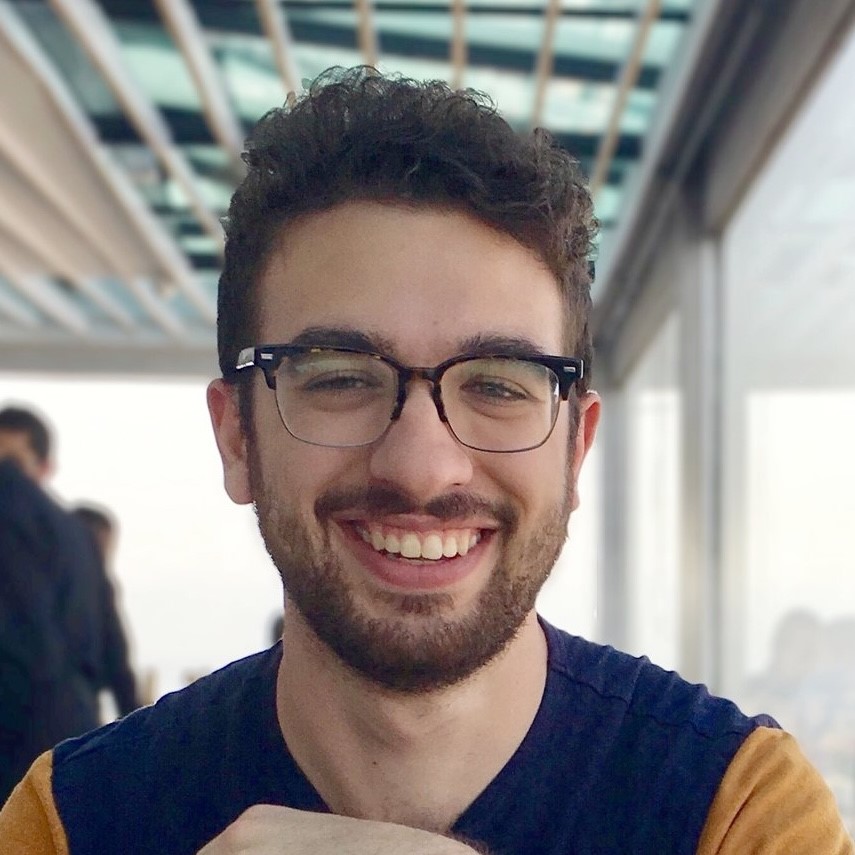
Eric Gonzalez, Google
ejgonz@google.com
Eric Gonzalez is a researcher at Google in the Blended Interaction Research & Devices (BIRD) Lab. He broadly works on enabling interactions and experiences that bridge the physical and digital in immersive mixed reality. Prior to Google, he completed his PhD at Stanford University working with Prof. Sean Follmer in the SHAPE Lab, where his research focused on augmenting haptic experiences in VR through tangible displays and perceptual illusions.
Yuhang Zhao, University of Wisconsin-Madison
yuhang.zhao@cs.wisc.edu
Dr. Zhao is an assistant professor in the department of Computer Sciences at the University of Wisconsin-Madison. She received her Ph.D. degree from Cornell University. Her research interests include Human-Computer Interaction, accessibility, augmented and virtual reality, and mobile interaction. She designs systems and interaction techniques to empower people with diverse abilities both in real-life and virtual worlds.

Mar Gonzalez Franco, Google
margon@google.com
Mar is a prolific computer scientist and 2022 IEEE VR New researcher awardee. She is deeply involved with creating Open Source tools, and has released the Microsoft Rocketbox avatars, the Movebox and Headbox animation toolkits, Embodiment questionnaires, mods for the AIRSim simulation tool to do crowds (CityLifeSim), code/HW for latency measurement, and more recently AI tools to do segmentation like Google DiffSeg. (all repos are available in https://github.com/margonzalezfranco/)
Inceptor: An Open Source Tool for Automated Creation of 3D Social Scenarios
Dan Pollak, School of Computer Science, RUNI
Jonathan Giron, School of Computer Science, RUNI
Doron Friedman, School of Computer Science, RUNI
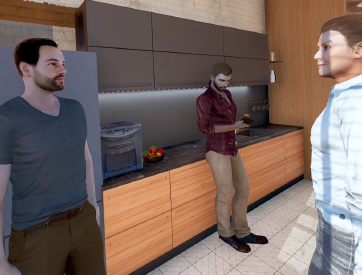
Cybersickness assessment framework(CSAF): An Open Source Repository for Standardized Cybersickness Experiments
Adriano Viegas Milani, Ecole Polytechnique Federale de Lausanne
Nana Tian Ecole Polytechnique Federale de Lausanne

Visualsickness: A web application to record and organize cybersickness data
Elliot Topper, The College of New Jersey
Paula Arroyave, The College of New Jersey
Sharif Mohammad Shahnewaz Ferdous, The College of New Jersey
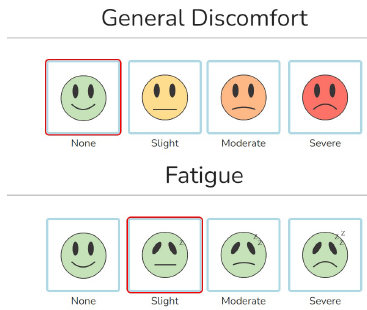
Streamlining Physiological Observations in Immersive Virtual Reality Studies with the Virtual Reality Scientific Toolkit
Jonas Deuchler, Hochschule Karlsruhe, University of Hohenheim
Wladimir Hettmann, Hochschule Karlsruhe, University of Hohenheim
Daniel Hepperle, Hochschule Karlsruhe, University of Hohenheim
Matthias Wolfel, Hochschule Karlsruhe, University of Hohenheim
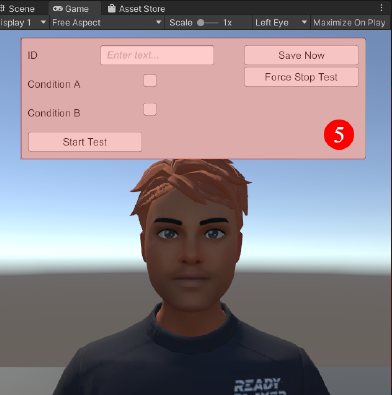
Semi-Automatic Construction of Virtual Reality Environment for Highway Work Zone Training using Open-Source Tools
Can Li, University of Missouri
Zhu Qing, University of Missouri
Praveen Edara, University of Missouri
Carlos Sun, University of Missouri
Bimal Balakrishnan, Mississippi State University
Yi Shang, University of Missouri
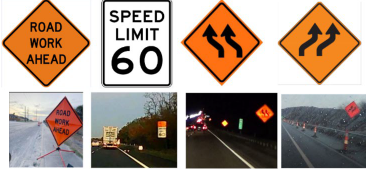
A Preliminary Interview: Understanding XR Developers’ Needs towards Open-Source Accessibility Support
Tiger F. Ji, University of Wisconsin-Madison
Yaxin Hu, School of Computer Science, RUNI
Yu Huang, Vanderbilt University
Ruofei Du, Google Labs
Yuhang Zhao, University of Wisconsin-Madison

Ubiq-Genie: Leveraging External Frameworks for Enhanced Social VR Experiences
Nels Numan, University College London
Daniele Giunchi, University College London
Benjamin Congdon, University College London
Anthony Steed, University College London
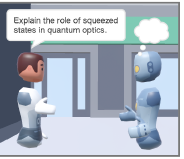 pdf
pdf Virtual-to-Physical Surface Alignment and Refinement Techniques for Handwriting, Sketching, and Selection in XR
Florian Kern, HCI Group, University of Wurzburg
Jonathan Tschanter, HCI Group, University of Wurzburg
Marc Erich Latoschik, HCI Group, University of Wurzburg
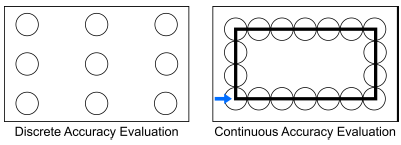 pdf
pdf Data Capture, Analysis and Understanding
Rag-Rug: An Open Source Toolkit for
Situated Visualization and Analytics
Dieter Schmalstieg, Philipp Fleck
(Invited from TVCG paper)
https://github.com/philfleck/ragrug
Developing Mixed Reality Applications with Platform for
Situated Intelligence
Sean Andrist, Dan Bohus, Ashley Feniello, Nick Saw
https://github.com/microsoft/psi
STAG: A Tool for realtime Replay
and Analysis of Spatial Trajectory and Gaze Information captured in Immersive
Environments
Aryabrata Basu
Excite-O-Meter: an Open-Source
Unity Plugin to Analyze Heart Activity and Movement Trajectories in Custom VR
Environments
Luis Quintero, Panagiotis Papapetrou, John
Edison Muñoz Cardona, Jeroen de De
mooij, Michael Gaebler
https://github.com/luiseduve/exciteometer/
Perception and Cognition
An Open Platform for Research about Cognitive Load in
Virtual Reality
Olivier Augereau, Gabriel Brocheton, Pedro
Paulo Do Prado Neto
 https://git.enib.fr/g7broche/vr-ppe
https://git.enib.fr/g7broche/vr-ppe
Human Vision vs. Computer Vision: A Readability Study in a
Virtual Reality Environment
Zhu Qing, Praveen Edara
Asymmetric Normalization in Social Virtual Reality Studies
Jonas Deuchler, Daniel Hepperle, Matthias
Wölfel
Authoring and Access
BabiaXR: Virtual Reality software
data visualizations for the Web
David Moreno-Lumbreras,
Jesus M. Gonzalez-Barahona, Andrea Villaverde
 https://babiaxr.gitlab.io/
https://babiaxr.gitlab.io/
RealityFlow: Open-Source
Multi-User Immersive Authoring
John T Murray
NUI-SpatialMarkers: AR Spatial
Markers For the Rest of Us
Alex G Karduna, Adam Sinclair
Williams, Francisco Raul Ortega
Avatar Tools
Physics-based character animation for Virtual Reality
Joan Llobera, Caecilia Charbonnier
 https://joanllobera.github.io/marathon-envs/
https://joanllobera.github.io/marathon-envs/
HeadBox: A Facial Blendshape Animation Toolkit for the Microsoft Rocketbox Library
Matias Volonte, Eyal
Ofek, Ken Jakubzak, Shawn Bruner, Mar Gonzalez-Franco
https://github.com/openVRlab/Headbox
Integrating Rocketbox Avatars with
the Ubiq Social VR platform
Lisa Izzouzi, Anthony Steed
https://github.com/UCL-VR/ubiq